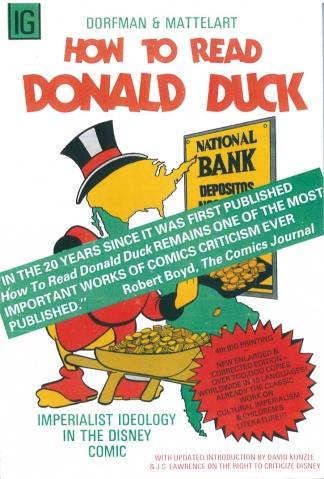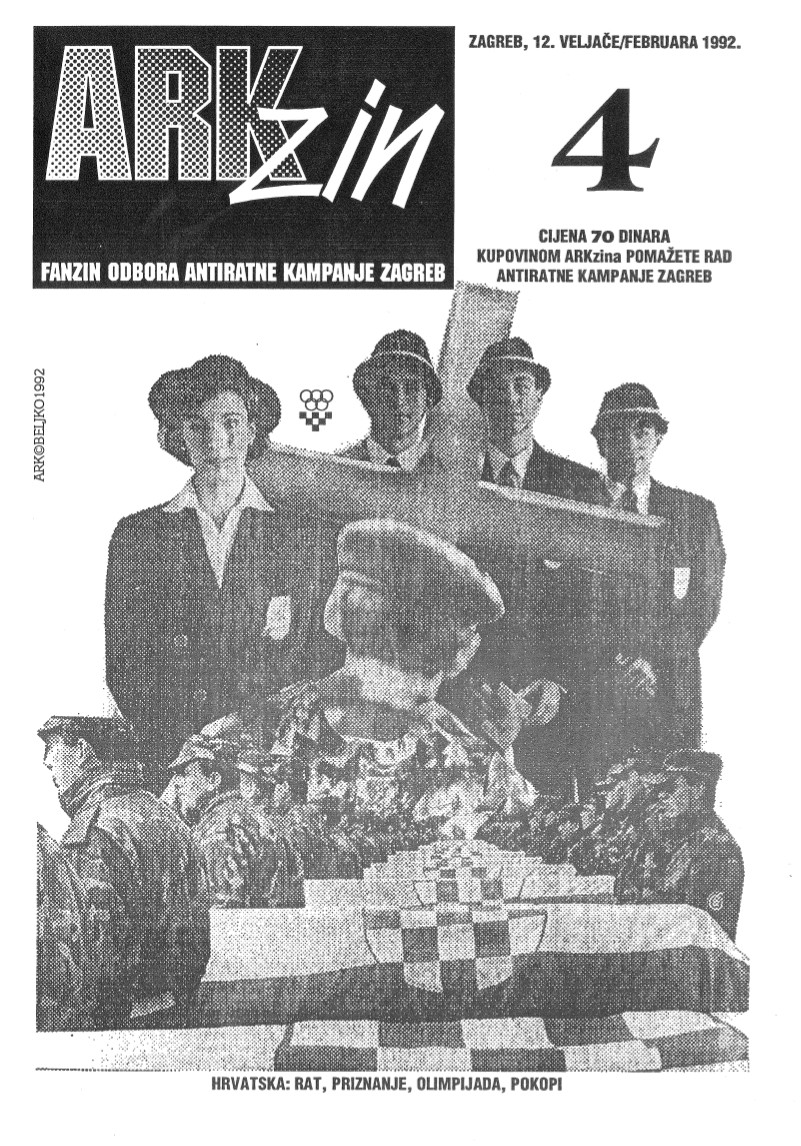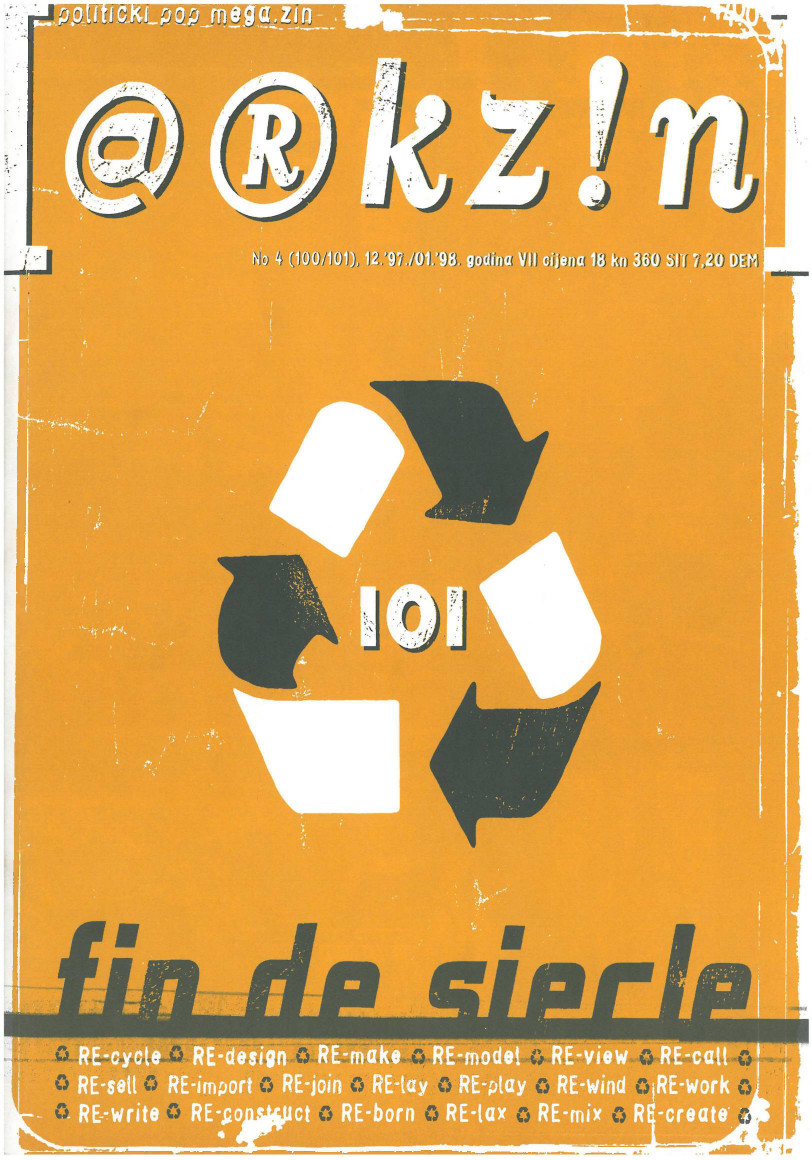Ariel Dorfman, Armand Mattelart: How to Read Donald Duck: Imperialist Ideology in the Disney Comic (1972–) [ES, IT, EN, PT, TR]
Filed under book | Tags: · capitalism, colonialism, comics, cultural criticism, entertainment, ideology, literary criticism, marxism, political theory, politics

How to Read Donald Duck is a Marxist political analysis by Ariel Dorfman and Armand Mattelart on what they perceive is cultural imperialism in popular entertainment, published in Chile in 1972. Written in the form of essay (or, in the authors’ words, a “decolonization manual”), the book is an analysis of mass literature, specifically the Disney comics published for the Latin American market. It is one of the first social studies of entertainment and the leisure industry from a political-ideological angle, and the book deals extensively with the political role of children’s literature. (from Wikipedia)
First published by Ediciones Universitarias de Valparaíso, Chile, 1972
First published in English in 1975
Translated and with an Introduction by David Kunzle
With Appendix by John Shelton Lawrence
Publisher International General, New York, 1991 (Fourth printing)
ISBN 0884770370
119 pages
via Quaxo Coricopat
An interview with Mattelart in which he shortly discusses the book (2008, in English)
2012 project for appropriation of the book (includes its online edition)
Para leer al Pato Donald. Comunicación de masa y colonialismo (Spanish, 18th ed., 1972/1979)
Come leggere Paperino. Ideologia e politica nel mondo di Disney (Italian, trans. Gianni Guadalupi, 1972, added on 2023-7-31)
How to Read Donald Duck: Imperialist Ideology in the Disney Comic (English, trans. David Kunzle, 1975/1991, 10 MB, updated 2015-5-10)
Para ler o Pato Donald: comunicação de massa e colonialismo (Portuguese, trans. Álvaro de Moya, 2nd ed., 1976/1980)
Emperyalist Kültür Sanayii ve Walt Disney: Vakvak Amca Nasıl Okunmalı? (Turkish, trans. Atilla Aksoy, 1977)
Arkzin (1991–1998) [Croatian, English]
Filed under magazine | Tags: · activism, croatia, graphic design, media activism, political theory, politics, tactical media, theory, war, yugoslavia


Arkzin was a periodical published in Zagreb, Croatia, from 1991 to 1998. It began as a political fanzine and later on the editorial board widened the scope and included international members and topics. Arkzin gradually changed to a hybrid magazine in which politics, culture, theory and art met, crossed and overlapped.
In total, 106 issues appeared, including eight in English (between April 1993 and January 1994). Five issues of the periodical for critical writing Bastard were published as a supplement to the magazine.
The editors-in-chief of Arkzin were Vesna Janković (I/1-3, II/1-90), Miroslav Ambruš Kiš, Zoran Oštrić (I/1-3), Vladimir Desnica (I/5-6), and Dejan Kršić (II/91-93, III).
PDFs (Monoskop wiki, via MaMa & Human Rights Archive)
See also Prospects of Arkzin catalogue (48 pp, 2013)
Matthew Fuller, Andrew Goffey: Evil Media (2012)
Filed under book | Tags: · algorithm, art, artificial intelligence, business, code, computing, data, database, event, governance, information, interaction, interface, knowledge, labour, language, machine, management, market, media, media theory, memory, military, networks, philosophy, political theory, politics, power, programming, software

“Evil Media develops a philosophy of media power that extends the concept of media beyond its tried and trusted use in the games of meaning, symbolism, and truth. It addresses the gray zones in which media exist as corporate work systems, algorithms and data structures, twenty-first century self-improvement manuals, and pharmaceutical techniques. Evil Media invites the reader to explore and understand the abstract infrastructure of the present day. From search engines to flirting strategies, from the value of institutional stupidity to the malicious minutiae of databases, this book shows how the devil is in the details.
The title takes the imperative “Don’t be evil” and asks, what would be done any differently in contemporary computational and networked media were that maxim reversed.
Media here are about much more and much less than symbols, stories, information, or communication: media do things. They incite and provoke, twist and bend, leak and manage. In a series of provocative stratagems designed to be used, Evil Media sets its reader an ethical challenge: either remain a transparent intermediary in the networks and chains of communicative power or become oneself an active, transformative medium.”
Publisher MIT Press, 2012
ISBN 0262304406, 9780262304405
235 pages
Review: Nicholas Holm (Media Int’l AU, 2013), Neural (2013).
Evil media on Monoskop wiki
PDF (updated on 2024-4-13)
HTML (added on 2015-8-28)
See also YoHa, et al., Evil Media Distribution Centre, 2013.
Comments (2)
